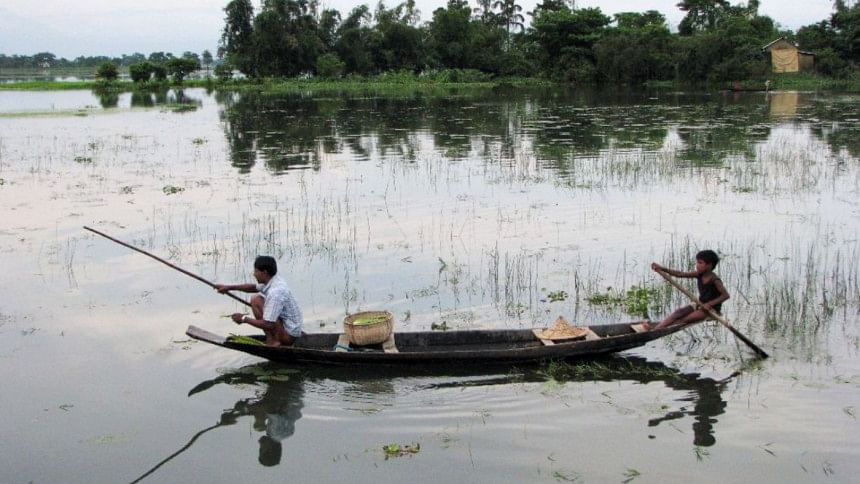Conserve haor to combat climate change impacts

Each year, the second day of February is commemorated worldwide as the World Wetlands Day, marking the day when the Ramsar Convention on Wetlands of International Importance was adopted by UN member-states in 1971, in the city of Ramsar in Iran, to raise awareness of the preservation and judicious use of wetlands and their resources. In line with its theme "Wetlands and Climate Change", this year's World Wetlands Day particularly stresses the importance of wetland conservation as a key to coping with climate change.
Globally, the wetlands are at risk of declining rapidly both in terms of quantity and quality. The Ramsar Convention on Wetlands, in a 2018 report titled "Global Wetland Outlook: State of the World's Wetlands and their Services to People", claimed that globally, the wetlands are disappearing three times faster than forests, with 35 percent of the world's wetlands lost since 1970. This trend is, without any doubt, alarming.
Bangladesh is well-known as a riverine country with vast areas of low-lying land including wetlands, locally known as haor. According to the Master Plan of Haor Area adopted in 2012, there are 373 haor/wetlands in the seven north-eastern districts of the country, covering about 859,000 hectares of land. These wetlands can help us stabilise emissions of greenhouse gas and cope with climate change impacts in a number of ways.
Wetlands absorb and store excessive rainfall water and reduce the risk of flood. They release stored water that can delay the onset of drought. Well-managed wetlands can also ensure that people living in the wetland areas are resilient and able to bounce back after the occurrence of natural hazards.
Moreover, the wetlands also have social and economic importance, providing livelihood opportunities to thousands of people living in the areas. In the context of climate change and increased risk of disaster, conservation of the wetlands is no less important for us than achieving the goals of Paris Agreement and the 2030 Agenda for Sustainable Development.
But, alarmingly, the wetlands of Bangladesh are also at risk of disappearing as the ecology of our wetlands is under constant threat. They are also severely impacted by climate change and global warming. The Bangladesh Delta Plan (BDP) 2100 identified the haor region as vulnerable to climate change impacts. Flash flood hits the region almost every two or three years and damages its Boro crops—the only means of livelihood for most of the people living there.
A recent study published in Theoretical and Applied Climatology journal projected that there is a possibility of rise in the amount of total rainfall and frequent occurrence of flash floods with high volumes around the haor basin of Bangladesh. While conducting the study, researchers analysed various aspects of future rainfall projection and temperature extremes. Another study published in Global Social Welfare journal also observed that fish availability, fish diversity, presence of migratory birds, aquatic plants, and the water-retaining capacity of the haor region have all been affected significantly, while the occurrence of sudden floods, storm, drought and human viral diseases increased extensively.
The wetlands-based ecosystem is also being affected by pesticides used in paddy fields, over-exploitation of fish resources, increased settlement in the areas, and lack of awareness among the local people of the preservation and conservation of haor resources.
However, climate is not the only issue for them. Since their livelihoods are frequently disrupted by natural hazards and the majority of areas are out of road network, they suffer from abject poverty. The region performs poorly in all social indicators—ranging from education and health to sanitation and hygiene. Given the context, any development effort meant for these people should focus on their holistic development, from economic to social to environment. Development projects should take the ecosystem, environmental issues and special requirements of the region into account. The local community should also be made aware of the importance of the preservation and sensible use of the haor bodies.
Since the livelihoods of people living in these haor areas are vulnerable to, and affected by, the climate change impacts, climate adaptive livelihood options are also required. Under no circumstances should we alter the natural ecosystem of the areas. Livelihood diversification and creation of alternative livelihood options may reduce the pressure on haor resources. These wetlands should not be drained, for when burned or drained, the most effective carbon sinks may turn into carbon sources.
Another issue important for the haor community is data shortage. All available data, except the data available in the Master Plan of Haor Area, from the Bangladesh Bureau of Statistics (BBS), provide district-wise information that do not necessarily reflect the situation of the haor community. For instance, a number of haors are located in Sylhet district, but the poverty rate for the district does not reveal the exact rate of poverty for haor dwellers. The BBS can undertake a new project to regularly collect and publish data related only to haor areas that will also help the government monitor the progress of the master plan. The data should include all relevant issues—climate, environmental, economic and social.
We all should work together to restore and protect the amazing ecosystem of our haors/wetlands and thus brace for the climate change impacts. To that end, effective and enhanced partnership among the key stakeholders is needed. The government, affected individuals and communities, and development organisations have a stake in this regard. We should keep in mind that if our development takes precedence over haor ecology, the environmental effects are bound to be devastating. On the other hand, leaving the hard-to-reach community behind in terms of development can never bring the optimum result. Our commitment to protecting our haor together with ensuring the holistic development of the haor community can bring a sustainable solution to the problem.
Shekh Farid is Statistical Officer at Bangladesh Bureau of Statistics (BBS).
Email: [email protected]





Comments